Final report for STN19-001
Project Information
The University of Tennessee Extension and Tennessee State University are committed to providing opportunities for training of Extension Agents and Specialists in the area of sustainable agriculture. In the coming year the state coordinators, program assistant and the new SARE Advisory Committee will work together to identify needs and address those areas where Extension professionals lack training concerning sustainable agriculture practices. Additional methods to use in order to determine the future of the SARE program will include, surveying agents, visiting with Extension regional agriculture program leaders, and agency partners. The program assistant will focus upon bringing awareness of the SARE Professional Development Program (PDP) to Extension agents and how it can benefit their county or area educational programming. Extension agents and specialists who attend training to learn more about sustainable agriculture, will be expected to report to the program assistant their experiences and information they learned. This will supply a major portion of the SARE annual report and will also enable the state coordinators and the program assistant the ability to make changes or adjustments in the PDP. The program assistant will also look for opportunities to promote SARE through scheduled in-service trainings and with regional professional association meetings, with sponsorship of two regional meetings per year. The program assistant will work closely with Southern SARE to make sure the programming efforts in Tennessee are:
- aligned properly with the overall mission of SARE
- meeting the needs of Extension Agents and Specialists who want to increase their level of knowledge of sustainable agriculture
- assisting Extension Agents and Specialists in passing the information they have gained to their local producers
The overall objectives for the state SARE program will be overseen and developed in conjunction with the state co-coordinators, program assistant and advisory committee. The state plan will be based on local needs and will continue to grow in order to convey to agents and specialists the newest and latest knowledge on sustainable agriculture. Outreach will continue to be a key component of the state plan. Keeping agents informed of opportunities within SARE as it relates to programs targeted to livestock, marketing, sustainability, vegetables and cover crops is needed in order to ensure success of the state model program. New and emerging issues will be noted as they arise and adjustments to programs and plans may be needed to address these new issues.
The main audience for the SARE Professional Development Program will include Extension Agents and other industry leaders in Tennessee. The objective of having the PDP designed as a train-the-trainer model, will work well as agents will be able to gather information they have learned at meetings, seminars or conferences, and bring that back to producers within their own county. Being able to document behavioral change within an audience takes a long period of time and dedication to a program. Efforts will be made by the program assistant within the next two years to devote time to create a short survey to be used with Extension Agents to determine behavioral changes with their audiences. Our plan is to reach 200 Extension Agents, Extension Specialists and other agriculture leaders through the many training programs that will be conducted by the SARE program in Tennessee. The ability to learn and pass that information to others is another vital component of the Tennessee SARE Program.
PLANNED ACTIVITIES WERE SUSPENDED DUE TO PANDEMIC RESTRICTIONS BEGINNING MID-MARCH OF 2020. The University of Tennessee restricted travel and discontinued in-person educational meetings during this time.
Advisors
- (Educator)
- (Educator)
- (Educator)
- (Educator)
- (Educator)
- (Educator)
- (Educator)
- (Educator)
- (Educator)
Education
In 2019, the following subject areas will be addressed in order to have a comprehensive program for agents that have an interest in the SARE program and sustainable enterprises:
-
- Sustainable Agriculture
- Specialty Crops and Cropping Systems
- Small Ruminants and Livestock Enterprises, Sustainability
- Value-Added Opportunities
- Farm Financial Management
- Opportunities for Small Farm Operators
- Management and Marketing of Produce
These items will serve as the focus of the SARE educational program, but as things change throughout the year, new and emerging issues will also be addressed if needed.
Education & Outreach Initiatives
Train Extension Agents in the areas of Value-Added Agriculture and the use of Alternative Crops in order to help make some farms in Tennessee more sustainable.
The Sustaining Tennessee Farms with Value-Added Agriculture and Alternative Crops Agent In-service was held November 19-20, 2019 in Maury and Giles Counties. The training included a combination of classroom sessions taught by eight Extension specialists and tours of six value-added agriculture enterprises. The in-service was funded by the Sustainable Agriculture Research and Education (SARE) Program and UT Extension Agricultural and Natural Resources and Community Development.
The Pick Tennessee Conference provides Extension agents with training on a variety of horticultural, small fruits, vegetables and agritourism topics. It also allows Extension Agents the opportunity to network with up to eight different Tennessee Producer Associations during the three-day conference.
Trainings, informational sessions and farm tours are conducted on vegetable production, beekeeping, specialty crops, small/beginning farmer programs, TN AgrAbility, organic production, cut flowers, farmers market and a variety of other topics that are of interest to Extension Agents, producers, other agriculture professionals and industry representatives. This three-day event is conducted by eight different Tennessee Producer Associations with assistance from the University of Tennessee and Tennessee State University.
2020+PTP+Conf+ProgramR-9 2020 Pick TN Conference Agenda
2022+Pick+TN+Conf+Agenda 2022 Pick TN Conference Agenda
Comments from a portion of the eighteen Extension Agents/Specialists who attended the 2020 and 2022 Pick TN Conference.
- Learned and enjoyed the session on "Garlic Production in TN." I did not know much about this crop, but learned it is a great crop to grow over the winter.
- The updates on plant fertility, the Industrial Hemp update, the small fruit and nut production updates, plants for attracting bees were all well planned and provided great information to agents.
- The session - "How to start a Farmers Market" will be very helpful in my work with farmer market vendors; also the Farmers Market Regulations session done by TN Department of Agriculture personnel proved to be helpful also. The session - Target Marketing" will be good information to share with our farmer's market manager to increase marketing opportunities.
- The Pick TN Conference provided many excellent opportunities for learning and networking on topics relate to sustainable agriculture. The following sessions were of particular interest and benefit for me:
- Starting a farmers market
- Overview of SARE Programs
- GAP, FSMA and PSA Compliance
- Overview of lesser-known specialty crops for TN Agriculture
- Grape and wine opportunities for TN
- Information I learned from two sessions about social media marketing will be helpful as I offer workshops and webinars on various aspects of digital marketing for direct farm marketers and value-added agriculture operators. The presenter touched on several topics I was unfamiliar with including the use of stories and like audiences on Facebook and the rules for running contests on Facebook. Social media is an important way for many producers to build relationships with consumers and connect with potential new customers with little financial outlay.
- Another attendee said about this social media workshop that many of the specialty crop growers she works with in Extension are small business entrepreneurs diving into a world of the unknown. The agents feels the skills she learned can be of service to this audience who is trying to find ways to connect with the community and their prospective buyers.
- Attending a session on Hemp Production in Tennessee, will provide me with much information I have been needing to answer phone calls in my office on this subject. I wanted to attend as many workshops on Hemp as I could while at this conference. Attending the hemp related topic presentations have given me more insight as to the benefits of hemp and production practices to help me answer questions from the public.
-
I certainly appreciate the opportunity to participate in the 2020 PickTN Conference in Franklin. I learned more about the implementation of FSMA for fruit and vegetable growers, and their opportunity to become GAP certified. The Tennessee Department of Agriculture offers producers the opportunity to conduct a produce safety readiness review. Dr. Lockwood shared information about elderberries and other not-so-commonly-grown crops for producers considering adding those to their annual production.
Thank you for the SARE funding.
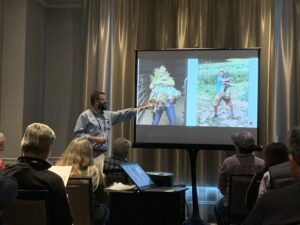
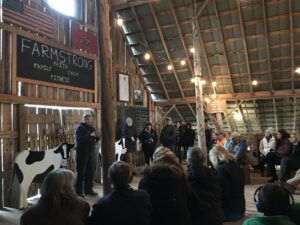
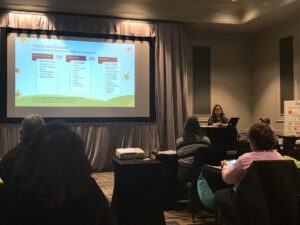
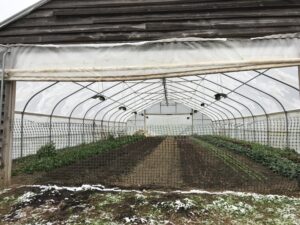
The Texas Agriculture Educational Tour included many diverse operations practicing sustainability. The three pillars of sustainability are profit over the long-term, stewardship of natural resources, and quality of life for farmers and their communities. The educational tour provided an opportunity for Tennessee Extension agents to connect with one another and learn from agribusiness owners and Texas A&M Extension Agents. This event also provided Extension Agents an opportunity to learn agricultural techniques and management practices used in Texas that could be implemented on the farm in Tennessee. Agents will be able to take the information learned and share their knowledge gained with Tennessee producers in their communities
Seven Extension Agents, two area specialist and 36 producers (representing 14 counties in Tennessee) attended the Texas Agriculture Educational Tour. The SARE Funds were only used by the agents/specialists to assist with their travel funds and these funds were only a partial portion of their entire expenses. These agriculture professionals learned from the farm visits many ideas those producers in Texas are using to keep their farms profitable and sustainable from generation to generation.
A review of the event can be found at the link below with highlighted sections emphasizing the sustainable ideas learned from the farm visits.
Learn from experienced specialty crop producers, agritourism operators and farms, other ag venues and farm markets.
The Tennessee Agritourism Association conducted the Northeast Rolling Workshop in the summer of 2021 over a five-day period, visiting farms in Pennsylvania and Maryland. SARE Funds were used for travel expenses for two Extension Agents from East Tennessee to participate in this event.
Comments from the Extension Agents participating in this event:
ROSE-Tennessee Agritourism Association Report
Northeast Rolling Workshop Trip Summary
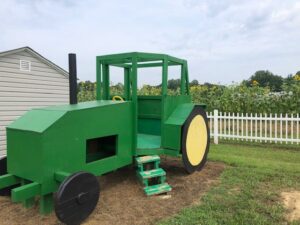
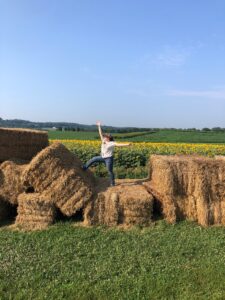
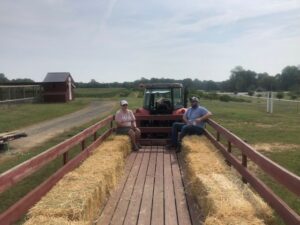
Extension Agents to learn:
*Economics of Forage Systems
*Soil Fertility and Health
*How Legumes work in a Forage System
*Forage Physiology and Production
*Keeping Perennial Grasses for Years to Come
*Weed Control
*Forage-Based Nutrition Basics
*Conserved Forage Production
Seven Extension Agents from Tennessee attended the SSARE Forage Training for Agents and Producers held April 11 and 12, 2022, in Columbiana, Alabama. The first day of training consisted of classroom sessions and learning; while the second day was more hands-on including weed ID, sprayer calibration and many forage demonstrations on rotational stocking strategies, forage defoliation frequency and intensity, soil health, using a grazing stick and hay bale quality and nutrition levels.
Comments from Agents included:
- Wonderful Trip
- Excellent learning and tons of connections with the other universities
- Can't wait to share our experiences with other agents, but most importantly with our producers who will benefit for years from this training
- Thanks for making this trip available
- Thank you for the opportunity provided in getting us linked up to the SSARE Field Day
- It was one of the best training sessions I have been to since I began my career in Extension
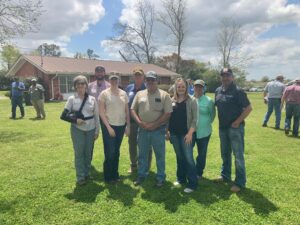
TN Extension Agents pictured at the SSARE Field Day, April 2022, with Dr. Katie Mason, UT Extension Animal Science, (Front, 2nd from left)
Educational & Outreach Activities
Participation Summary:
Learning Outcomes
Project Outcomes
Face of SARE
The SARE program is a great benefit to Extension agents, specialists and other agriculture professionals in Tennessee as it provides a mechanism to learn about sustainable agriculture and how this can be used to train producers. This is done by allowing a number of travel scholarships to agents/specialists where they can learn first-hand by attending conferences, workshops and tours on a variety of sustainable agriculture subjects. The promotion of the SARE program in Tennessee has been conducted in the following ways:
- Regional Agriculture Agents Monthly Meetings
- Annual Professional Agents’ Association Meetings
- Personal and Group Emails
- Individual Visits with Agents/Specialists
- State Website
- Promotional Banners and Exhibits at Trade-Shows, Agent In-Services and Planning Meetings
- Educational materials provided at Exhibits and to Extension Agents and Producers
Efforts are made to exhibit a seamless SARE program that includes Extension Personnel from the University of Tennessee and Tennessee State University.